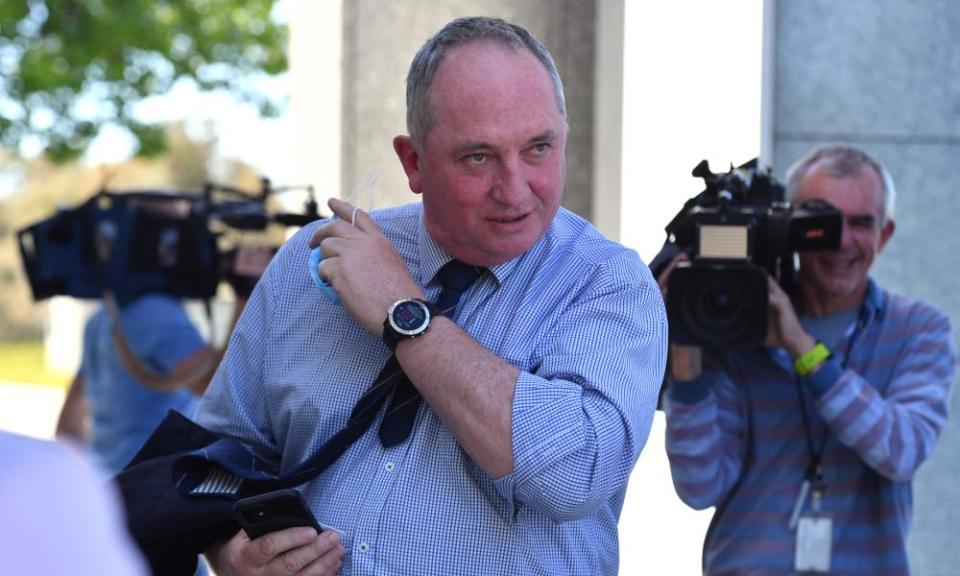The Nationals won’t support a much tougher 2030 emissions target, Barnaby Joyce says

The Nationals leader, Barnaby Joyce, has suggested it is “highly unlikely” his party will agree to Australia significantly increasing its 2030 emissions reductions target, ahead of a party room meeting to discuss the Morrison government’s climate policy.
The Liberal energy minister, Angus Taylor, has been tasked with walking the junior Coalition partner through the climate proposal, with the Nationals to make a decision on what they’re prepared to support following Sunday’s presentation.
Joyce all but ruled out any changes to the 26-28% emissions target already set down for 2030, despite pressure from the international and scientific community that more needs to be done. Asked if the Nationals would be prepared to double the emissions reduction, Joyce told reporters: “I think that is highly unlikely.”
Joyce was more positive when it came to a potential agreement on a 2050 target. The prime minister, Scott Morrison, is trying to land a pledge to reach net zero by then.
“When Mr Taylor comes I am sure he would give an [indication] about how he sees that going forward and there will be [those] type of questions for Mr Taylor,” Joyce said before the meeting. “Once he has left the room and people have the capacity to have a discussion with party members within the Nationals, they will decide … how formative that deal is.”
The Nationals have spent the past week airing individual demands in exchange for supporting a net zero target, ranging from $250bn for the fossil fuel industry, to inland rail.
But with conservative Liberals including Peter Dutton now on board, and key agitators such as Joyce urging consensus, an agreement is expected to be reached.
Morrison confirmed on Friday he will attend the Cop26 climate conference in Glasgow, where key allies, including the US and the UK, expect to see a shift in Australia’s climate position.
Before he makes it to Scotland though, Morrison must negotiate support with the Nationals, to ensure the policy will pass the joint party room. While Morrison had hoped to have that tied up by Tuesday, when the Liberals and Nationals will come together for the first time in six weeks, he conceded on Friday an actual agreement was likely some time away.
“The government will be finalising its position for me to take to the summit prior to my departure over the next fortnight,” Morrison said. “We’re working through those issues with our cabinet and with our colleagues and I look forward to those discussions concluding over the next couple of weeks.”
Senior Labor senator Katy Gallagher on Sunday refused to rule anything in or out when it comes to the opposition’s climate policy as the ALP waits to see what the government offers.
Related: Australia’s biggest industry group calls on Morrison government to halve emissions by 2030
On ABC’s Insiders program, Gallagher said it was for the government to come up with an answer on the climate crisis, given it had been in power for eight years without a policy.
“We want to make sure the government does the job it needs to do, that it has been avoiding for eight years now, and what that is meaning is we are losing opportunities in jobs, and investment, and … they need to start doing it,” she said.
“This past week has been such an eye-opener. We’ve had the prime minister after doing nothing for eight years, now trying to wrangle the National party into telling him what he is allowed to say when he goes to Glasgow. That’s the state of where we are at.”

 Yahoo Finance
Yahoo Finance 